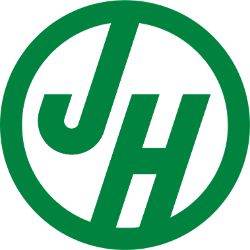
FMP

James Hardie Industries plc
JHX
NYSE
James Hardie Industries plc, together with its subsidiaries, manufactures and sells fiber cement, fiber gypsum, and cement bonded building products for interior and exterior building construction applications primarily in the United States, Australia, Europe, New Zealand, the Philippines, and Canada. The company operates through three segments: North America Fiber Cement, Asia Pacific Fiber Cement, and Europe Building Products. It offers fiber cement interior linings, exterior siding products, and related accessories; and various fiber cement building materials for a range of applications, including external siding, internal walls, floors, ceilings, soffits, trim, fences, and facades. The company also provides fiber gypsum and cement-bonded boards for applications, such as timber frame construction, dry lining, DIY, and structural fire protection. Its products are used in various markets comprising new residential construction and commercial construction markets. James Hardie Industries plc was founded in 1888 and is based in Dublin, Ireland.
31.75 USD
-0.12 (-0.378%)
DuPont Analysis
The DuPont analysis, pioneered by the DuPont Corporation, offers a structured approach to assessing fundamental performance. It involves breaking down the return on equity (ROE) into various components, aiding investors in comprehending the factors influencing a company's returns.
ROE = Net Income / Average Total Equity
ROE = (Net Income / Sales) * (Revenue / Average Total Assets) * (Average Total Assets / Average Total Equity)
The company's tax burden is (Net income ÷ Pretax profit). This is the proportion of the company's profits retained after paying income taxes. [NI/EBT] The company's interest burden is (Pretax income ÷ EBIT). This will be 1.00 for a firm with no debt or financial leverage. [EBT/EBIT] The company's operating income margin or return on sales (ROS) is (EBIT ÷ Revenue). This is the operating income per dollar of sales. [EBIT/Revenue] The company's asset turnover (ATO) is (Revenue ÷ Average Total Assets). The company's equity multiplier is (Average Total Assets ÷ Average Total Equity). This is a measure of financial leverage. Profitability (measured by profit margin) Asset efficiency (measured by asset turnover) Financial leverage (measured by equity multiplier)